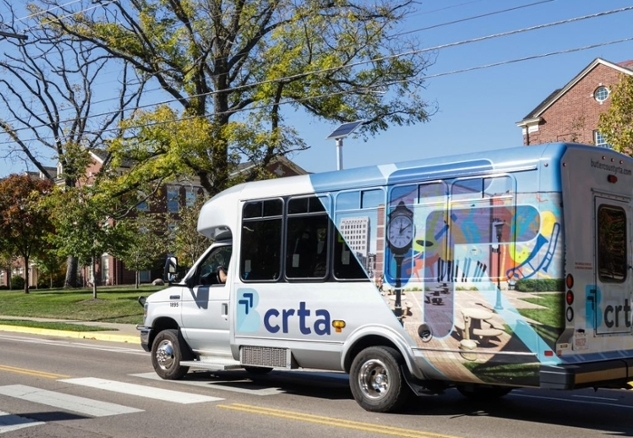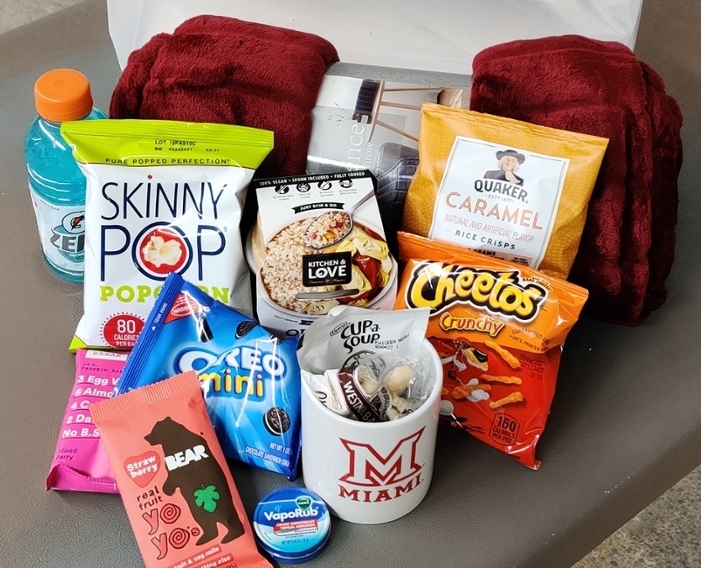Spring semester changes improve students' quarantine and isolation experience

By Kristal Humphrey, office of the dean of students
OXFORD, Ohio — Miami University staff and students worked together to improve the quarantine and isolation experience for students in the spring semester.
According to Kimberly Moore, associate vice president for Student Life and dean of students, changes were influenced by survey data, a student consulting project, the Associated Student Government (ASG), and student listening sessions.
“We are committed to continuous improvement,” Moore said.
Staff met with ASG to review their feedback document and listened to presentations by MUCCI, a student consulting group.
Moore also participated in a number of listening sessions with various students and student groups which helped triangulate the other sources of feedback. They consistently heard comments about the same topics: programming, transportation and microwaves.
Programming
With the help of the Honors Student Advisory Board and a graduate assistant in the office of the dean of students, COVID-19 case managers are sharing with students some options for things to do during quarantine and isolation.
Grace Hymel, a graduate assistant and student in the student affairs in higher education program, created lists of health/fitness resources to help students stay active and online social activities to enable them to stay connected with their peers.
Members of the Honors Student Advisory Board compiled lists of recommended books, movies, TV shows and video games.
Audrey Rabick, one of the board members and a chemical engineering major, said as they looked at potential philanthropy projects last semester, they knew they wanted to help the Miami community but were limited based on COVID-19 restrictions.
The office of the dean of students was doing a phenomenal job with accommodations, and after talking with Dr. Moore, it seemed that one of the biggest struggles for students in quarantine and isolation was boredom,” Rabick said. “Our goal was to make the unfortunate circumstances a little more bearable and make sure those students felt supported and acknowledged by their peers.”
Transportation
 BCRTA vehicles transport students to quarantine
BCRTA vehicles transport students to quarantine
and isolation on campus
Miami contract swith the Butler County Regional Transit Authority (BCRTA) to provide curb-to-curb transportation for students going into quarantine and isolation on campus. Students call to schedule a ride and are picked up by a driver in full personal protective equipment. The vehicle is cleaned after each trip.
The service provides a comfortable and safe way for students to get to their location and to leave their residence hall sooner, lowering the chance of exposure to healthy students.
Microwaves
Using funds from the CARES Act grant, Miami purchased 211 microwaves that physical facilities staff put in the quarantine and isolation buildings.
The CARES Act was a federal act that gave COVID-19 relief funds to the states. Ohio allocated some of the funds to the Prevention Action Alliance. As a member of the Ohio College Initiative, a program within the alliance, Miami applied for funds and was awarded $32,000 to aid in the support of students impacted by COVID-19, particularly those students in quarantine and isolation.
Care packages
 Care packages provide students in quarantine or
Care packages provide students in quarantine or
isolation with comfort and snacksFunds from the CARES Act grant were also used to purchase items for care packages to put in the quarantine and isolation rooms. Some items in the packages include microwaveable meals with some vegan and gluten-free options, a sherpa blanket, a mug, snacks and self-care items.
Students from Health Advocates for Wellness, Knowledge, and Skills (HAWKS) packed the care bags and delivered them to each building. The custodial staff puts one in each room after the room is clean.
Team effort provides care and support
Bringing the ideas to fruition was a team effort spearheaded by Student Life staff and with help from students and other staff across campus.
“Our top priority is to deliver a caring and supportive approach for our students during an unexpected and challenging time,” Moore said.

